Who was Mattie Rhodes and how did she die so young? KCQ delves into a local icon
“What’s your KC Q” is a joint project of the Kansas City Public Library and The Kansas City Star. Readers submit questions, the public votes on which questions to answer, and our team of librarians and reporters dig deep to uncover the answers.
Have a question you want to ask? Submit it now »
By Dan Kelly | dkelly@kcstar.com
Born 150 years ago in what was still officially the City of Kansas, Mattie Rhodes lived a quiet life that ended before she could accomplish anything that grabbed headlines. Yet her name resonates today.
The Mattie Rhodes Center serves thousands of individuals and families every year through social services, behavioral health counseling and the arts. Among other things, the center offers programs on substance abuse and mental health, domestic-violence intervention, youth-development programs and art classes.
Reader Susan Pepperdine, no doubt like many others in the area, wondered who Mattie Rhodes was. Pepperdine asked “What’s Your KCQ?”, The Star’s ongoing series with the Kansas City Public Library that answers readers’ queries about our region:
What’s the true story behind the Mattie Rhodes Center? I heard it was founded after its namesake was struck down by disease at a young age. With the current pandemic, it’s timely to ask how much good has come from her legacy.
In essence, the Mattie Rhodes Center exists because of one final, generous act by Mattie Rhodes herself.
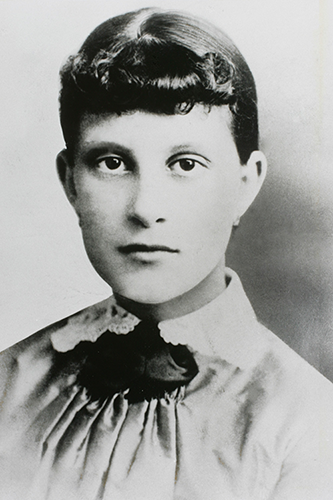
She and nine other female friends had formed a church group in 1890 dedicated to helping less-fortunate children. Calling themselves the Little Gleaners, they maintained a bed at Children’s Hospital with funds they raised by selling aprons for 25 cents and potholders for 7 cents.
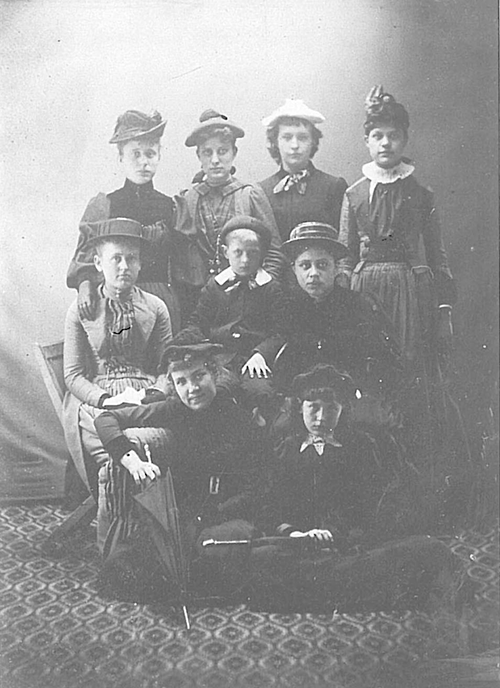
Mattie died of typhoid fever at the age of 19 on Oct. 1, 1890, and was buried in Elmwood Cemetery. She left $500 for the Little Gleaners to further their work assisting needy children.
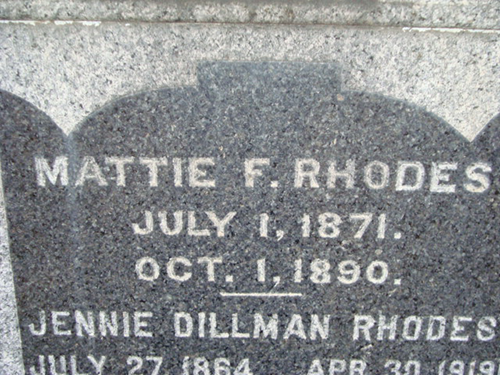
They honored Mattie’s wish by founding the Mattie Rhodes Memorial Society and starting the first free kindergarten in Kansas City. Over the past 125 years, it has evolved into one of the area’s most wide-ranging nonprofit operations.
Clearly, there has been a big return on Mattie Rhodes’ initial gift.
But where did the 19-year-old get that $500, roughly equivalent to $14,000 today?
“It’s not very clear,” said Angela Cecena Brunner, the Mattie Rhodes Center’s director of development and communications. “I heard it was her inheritance, because the family was pretty well off. So this would have been where she wanted her inheritance to go.”
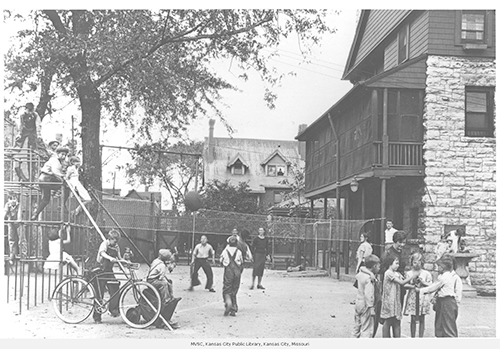
Help From Chicago
The Mattie Rhodes Memorial Society, which by 1894 had grown to 17 females, also received early help from two prominent women.
First they consulted Jane Addams, a social worker and reformer who was widely recognized for having founded Hull House in a poor Chicago neighborhood and who in 1931 would become the first American woman to win the Nobel Peace Prize. The free kindergarten was her idea.
Then the young women saw that the popular actress Julia Marlowe, known for her interpretations of Shakespeare, was bringing a show to the Coates Opera House. Marlowe, a typhoid survivor who would later appear in more than 70 Broadway productions, agreed to do a benefit performance of “The Belle’s Stratagem.”
“There were 1,460 or more women and perhaps a dozen men within the house,” said an article in The Star on Oct. 18, 1894. “The tickets sold for fifty cents each.” The net was another $600 for the Mattie Rhodes Memorial Society.
The entire effort was one of women helping women at a time when a male-dominated society considered them second-class citizens.
The society filed incorporation papers in 1896, with a charter stating that the Mattie Rhodes mission would be “a home where the young children of working mothers may be cared and provided for, instructed and entertained, during the hours of the day when such mothers are at work.”
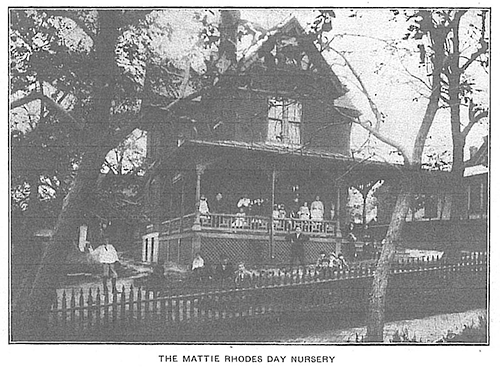
The day nursery and kindergarten opened in the city’s West Side at 1818 Woodland Ave. in January 1896. The Star said the new operation cared for 506 children in just May of that year.
“The idea was anyone could come to this nursery, whether they could pay or not,” Brunner said.
The center moved several times before settling at 1734 Jefferson St. in 1916. Fifty years later, a new building was built next door at 1740 Jefferson, which remained in use until 2019.
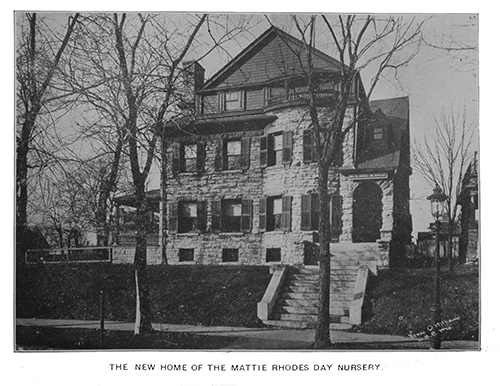
Mattie Rhodes Today
Now the only bilingual/bicultural, nationally accredited and state-certified behavioral health care provider in the region, the Mattie Rhodes Center has greatly expanded its services as well as its facilities. In addition to headquarters in the Northeast at 148 N. Topping Ave., it operates an arts center and art gallery on West 17th Street. Construction has recently begun on the Mattie Rhodes Cultural Center at 17th and Jarboe streets.
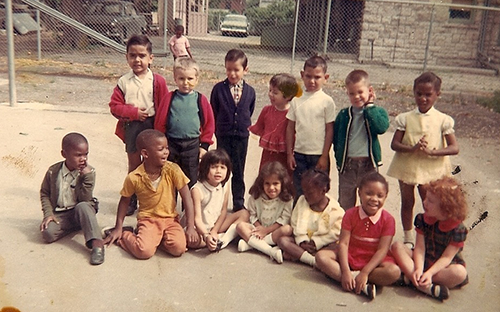
Throughout its long history, the goal has remained the same: providing help to people who need it.
When the center celebrated its centennial in 1994, The Star quoted several of those people.
“Mattie Rhodes was our refuge and delight,” said a woman who had attended dances and social activities at the center. “On reflection, it was a wonderful, safe place to be. And for most of us, it offered the only real stability in our lives.”
A man wrote: “I credit Mattie Rhodes with keeping a tremendous number of youths on the straight and narrow.”
Among them was Thomas Hayward, who spent many hours at the center during his youth. He went on to become a leading tenor for the Metropolitan Opera in New York during the 1940s and ’50s, with leading roles in “Madama Butterfly,” “La Traviata” and “Rigoletto.” He also starred in a long-running NBC radio show, “Serenade to America.”
Hayward, who died in 1995 at the age of 77, was known to drop by the Mattie Rhodes Center for visits when he returned to Kansas City.
Mattie Rhodes herself continues to play a part in the center’s activities. She was honored with an altar at a Dia de los Muertos (Day of the Dead) celebration in recent years, and Brunner said staff members share her story with the children.
“They incorporate the spirit of giving and caring for others, because that was a big part of her life,” Brunner said.
And an even bigger part of her death.
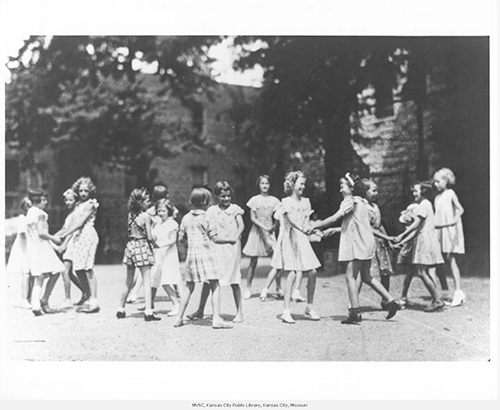
A Timeline
July 1, 1871: Mattie Florence Rhodes was born, the third child of John E. Rhodes and Catherine Dillman.
1890: The Little Gleaners were formed. A group of 10 young women from the Central Presbyterian Church, they volunteered to upkeep a bed at the Children’s Hospital on Broadway.
Oct. 1, 1890: Mattie Rhodes died of typhoid fever at age 19. She left $500 to the Little Gleaners.
1894: The Little Gleaners founded the Mattie Rhodes Memorial Society with Mattie’s $500.
January 1896: Mattie Rhodes Day Nursery (a day nursery and kindergarten) opened at 1818 Woodland Ave.
1896: After a few months, the Mattie Rhodes Day Nursery moved to 1809 Forest Ave.
1906: The Mattie Rhodes Day Nursery moved to 2340 Prospect (now Jarboe).
1916:The Mattie Rhodes Day Nursery moved to 1734 Jefferson St. The Mattie Rhodes Memorial Society began to help community members find jobs, food and shelter, and began to closely parallel social welfare programs.
1923: The kindergarten/day nursery closed because of changes in the public school system and became the Mattie Rhodes Neighborhood Center.
1950s:Mattie Rhodes hired a professional counseling staff. Activities such as crafts, cooking, dancing and games became common as well.
1966:Construction of a new building at 1740 Jefferson St. was completed.
1980s:In response to the growing Hispanic population in the West Side neighborhood, Mattie Rhodes began to offer programs in Spanish and English, hiring bilingual therapists and case managers.
March 12, 1986: At the urging of the United Way, the Mattie Rhodes Memorial Society merged with the Craft Learning Center. The name became the Mattie Rhodes Counseling and Art Center. The Mattie Rhodes Art Center was established at 915 W. 17th St.
1999: The Mattie Rhodes Art Gallery was established next door at 919 W. 17th St.
2005: The agency purchased a permanent facility in the Northeast at 148 N. Topping Ave.
2006: Mattie Rhodes Center moved into Kansas, providing therapeutic services in partnership with El Centro.
August 2019: The 1740 Jefferson office in the West Side closed.
January 2021: Construction began on the Mattie Rhodes Cultural Center at 17th and Jarboe streets.
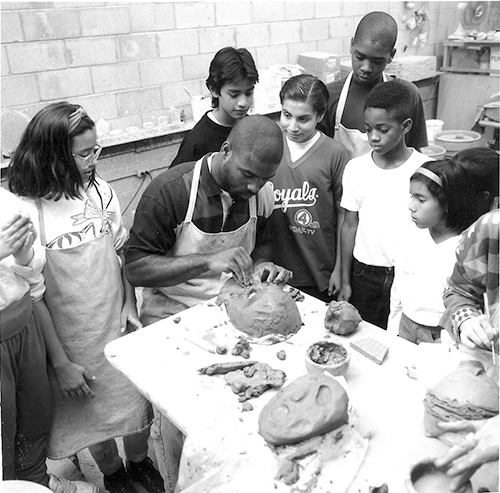
Submit a Question
Do you want to ask a question for a future voting round? Kansas City Star reporters and Kansas City Public Library researchers will investigate the question and explain how we got the answer. Enter it below to get started.
